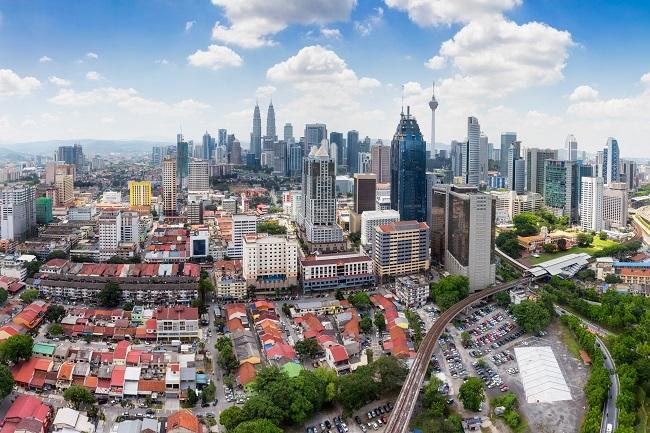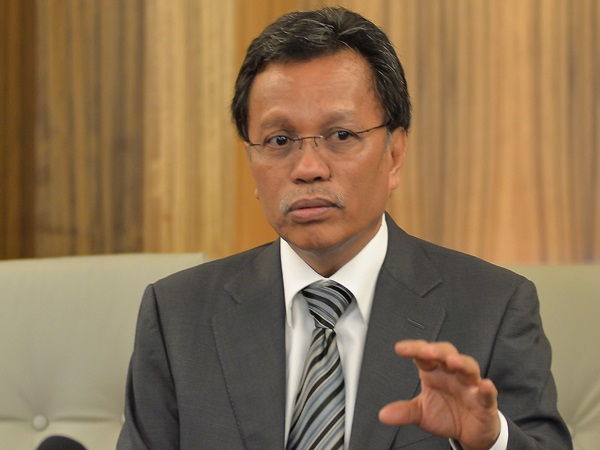Khazanah Nasional Bhd, which is due to release its annual performance review in February next month, will likely report a significant drop in the value of its investments in companies listed on Bursa Malaysia, in line with the weaker stock market performance in 2018.
Bursa Malaysia's benchmark FTSE Bursa Malaysia KLCI (FBM KLCI) registered a 5.17 per cent drop for the whole of last year, losing around RM192.85 billion in market capitalisation in the process.
Other markets in the region fared worse, including Japan (-12.08 per cent), South Korea (-17.69 per cent) and Hong Kong (-15.30 per cent). In the United States, the Dow Jones fell 5.6 per cent, S&P 500 was down 6.2 per cent and the Nasdaq slipped four per cent.
Against such a backdrop, seven listed companies on Bursa Malaysia in which Khazanah is a major shareholder lost a combined RM43.62 billion in market capitalisation for last year2018, according to stock market data.
The seven government-linked companies (GLCs) are Axiata Group Bhd, Telekom Malaysia Bhd, CIMB Group Holdings Bhd, UEM Sunrise Bhd, Tenaga Nasional Bhd, Time dotCom Bhd and Malaysia Airports Holdings Bhd.
For comparison, Khazanah's total investments in 2017 had a combined realisable asset value (RAV) of RM157.2 billion and a net worth adjusted value of RM115.6 billion.
When its annual report was released in January last year, the sovereign fund also reported a pretax profit of RM2.9 billion, an increase of 81.3 per cent, from RM1.6 billion in 2016.
Khazanah has investments in more than 100 companies across multiple sectors, industries and geographies, either directly or indirectly through ownership of shares.
About 55 per cent of its RAV by geographic exposure is in Malaysia. , and the rest remaining 45 per cent located overseas.
The sovereign fund, by undertaking strategic investments on behalf of the nation, plays a catalytic role in driving various strategic industries and national initiatives involving in sectors such as power, telecommunications, finance, healthcare, aviation, infrastructure, leisure and tourism, and property.
MIDF head of research Mohd Redza Abdul Rahman said FBM KLICI declined 5.2 per cent in 2018, outperforming the broader FBM EMAS index which fell 10.1 per cent and FBM Small Cap which declined 34 per cent over the same period.
"Markets stated we are seeing gains as high as six per cent in April before heading down between May and June as rate hikes in US resulted in outflow of foreign funds from both bond and equities market," he told NST Business.
Mohd Redza said the local markets then staged some recovery but fears of external geopolitical concerns such as trade war and no deal Brexit and declines in commodity prices, affecting market sentiment resulting in last year's declines.
He added the fall prices particularly the blue chips has affected Khazanah investee companies as well especially Telekom, Axiata, TNB, CIMB, Astro, lHH Healthcare and MAHB.
Bank Islam Malaysia Bhd chief economist Dr Mohd Afzanizam Abdul Rashid said the falling in share prices was mainly due to global uncertainty particularly in the second-half of 2018.
He said this was further exacerbated by external factors including trade war between US and China, which in turn affecting the tariff rate imposition and retaliation from China.
"The friction last year was very apparent, affecting businesses and the overall global markets sentiment," he said.
He added that the global purchasing managers' index (PMI) for manufacturing was reduced from 54.4 points to 51.5 points between January and December, 2018.
"The fall in MPI indicates the business sentiment was weakening," he said, adding that the prospects of higher interest rates in US could affect the global markets.
Dr Mohd Afzanizam said weak sentiment might also lead to lower capital expenditure and reduce labour hiring exercise. As such, the state of the economy would become very challenging in the near future.
Following the 14th General Election in May last year which saw the first change in government in 60 years, board of Khazanah's board members offered to resign in July to facilitate a smooth and orderly transition of power to the its new leadership management under the new Pakatan Harapan government.
Khazanah's current managing director of the sovereign wealth fund is Datuk Shahril Ridza Ridzuan.
The other current board members include Economic Affairs Minister Datuk Seri Azmin Ali, former Petronas chairman Tan Sri Mohd Hassan Marican, former Bank Negara Malaysia deputy governor Dr Sukhdave Singh and former Securities Commission executive director Goh Ching Yin.
In late November 2018, Khazanah disposed of 1.4 billion shares in IHH Healthcare, representing a 16 per cent stake, to Mitsui & Co Ltd of Japan for RM8.42 billion.
The disposal at RM6 per share would reduce Khazanah's stake in IHH to 26.05 per cent.
The disposal is slated for completion in the first-quarter of 2019.
MIDF head of research Mohd Redza Abdul Rahman said FBM KLICI declined 5.2 per cent in 2018, outperforming the broader FBM EMAS index which fell 10.1 per cent and FBM Small Cap which declined 34 per cent over the same period.
"Markets stated we are seeing gains as high as six per cent in April before heading down between May and June as rate hikes in US resulted in outflow of foreign funds from both bond and equities market," he told NST Business.
Mohd Redza said the local markets then staged some recovery but fears of external geopolitical concerns such as trade war and no deal Brexit and declines in commodity prices, affecting market sentiment resulting in last year's declines.
He added the fall prices particularly the blue chips has affected Khazanah investee companies as well especially Telekom, Axiata, TNB, CIMB, Astro, lHH Healthcare and MAHB.
Bank Islam Malaysia Bhd chief economist Dr Mohd Afzanizam Abdul Rashid said the falling in share prices was mainly due to global uncertainty particularly in the second-half of 2018.
He said this was further exacerbated by external factors including trade war between US and China, which in turn affecting the tariff rate imposition and retaliation from China.
"The friction last year was very apparent, affecting businesses and the overall global markets sentiment," he told NST Business.
He added that the global purchasing managers' index (PMI) for manufacturing was reduced from 54.4 points to 51.5 points between January and December, 2018.
"The fall in MPI indicates the business sentiment was weakening," he said, adding that the prospects of higher interest rates in US could affect the global markets.
Dr Mohd Afzanizam said weak sentiment might also lead to lower capital expenditure and reduce labour hiring exercise. As such, the state of the economy would become very challenging in the near future.
FXTM global head of currency strategy & market research, Jameel Ahmad said the continuity of volatility on a day-to-day basis in the global markets was not favourable for emerging markets assets and currencies, including Malaysia.
He said the prolonged trade tensions between US and China as well as the concerns on slowing global growth are the two major factors not only affecting the ringgit but negatively impacting most markets globally.
"Emerging market peers across the globe face significant downside risks heading into the next trading week, as global financial markets continue to be gripped by market turmoil," he said.
Asian Strategy & Leadership Institute (ASLI) Centre of Public Policy Studies chairman Tan Sri Ramon Navaratnam said the PH government wants much more efficiency in GLCs.
"The present government requires higher performance of corporate appointees as well as more competition in the business world," he said.
He also said the government needs to get good professionals to manage the GLCs, while phasing out those with political affiliations.
This was made in reference with the relinquishing of top executives in GLCs last year in an effort to instil more transparency and good governance.
"However, the government must address the size of GLCs - should some of the work be shared more with the private sector," he added.
Navaratnam said the government should also expand the private sector roles rather than concentrating on GLCs, citing that the latter is usually given protection of one kind or another.
"GLCs do not normally become as competitive as they should if the government continues to giving protection," he said.
Asked on whether the new government still appoint those with political affiliations, Navaratnam said: "I don't think the PH government's intention is to put its own political appointees."
However, he cautioned that the PH government must be very careful to avoid giving the impression that the administration is the same as the previous administration before.
"We want to see a difference. The appointments will show whether it is a political or professional appointment," he said.
Navaratnam said companies which are being dominated by one race will not do well as compared to multi-racial companies in a multi-racial country like Malaysia.
"Hence, it is time for GLCs to get smaller or become more multi-racial corporates," he said, adding that then only GLCs can enjoy greater public's confidence and record better business performance and profits and national unity as well.
To recap, GLCs are companies where the government has a direct majority or substantial stake via their investments entities such as Khazanah Nasional, Employees Provident Fund, Permodalan Nasional Bhd (PNB), the Armed Forces Fund (Lembaga Tabung Angkatan Tentera) and the Pilgrims Fund (Lembaga Tabung Haji).
Sunway University Business School economics professor Dr Yeah Kim Leng said GLCs are the important sector and the basis arm for the government to undertake social economic development.
"Appointed top executives have to be aligned with the government's aspirations. The government wants people with integrity and good governance, while instilling professionalism, competency and capability," he said.
Yeah said these are important traits to drive and achieve the government's objective of the mandate given to the GLCs.
"The changes involving top executives in GLCs were due to poor management and weak business performance as well as retirement, which based on their own accord upon expiry of their contracts.
"It will not be productive to pursue the reasons why some of them have been removed.
Most importantly is to look forward to the incoming CEOs to drive their respective organisations successfully," he said.
Yeah said GLCs not only have important role in developing the economy but also as agents of change for the government to implement some of the most difficult and challenging social economic programme including creating Bumiputera entrepreneur community and developing some of other agencies like MARA.
He added this is important to uplift the Bumiputera standard of living and income level.
"With the new leadership installed, the government will have a better chance to restructure and reorganising some of its agencies to achieve its mandate," he said.
Yeah said one of the key goals in driving the country's economic and social developments is to enhance the efficiency and effectiveness of the organisations or agencies in fulfilling their objectives.
There are various objectives throughout different sectors of the economy such as agriculture, energy, manufacturing, plantation and services.
He said this is important to ensure the government's subsidies reach the targeted recipients.
"We need effectiveness to drive development of these agencies, important in providing support and services to the both rural and low income group in order to enhance income generating opportunities," he said.
Yeah said GLCs provide strong support and services to the government, while enhancing the generating income opportunity for the country's targeted recipients, particularly the low-income group and urban-poor communities.
"GLCs are supposed to be the vehicle to spearhead the country's development of the selected industries such as agriculture, mining, services and manufacturing.
"Other agencies like Khazanah help the country's investment portfolio in healthcare, education, high-tech and manufacturing," he said.
Yeah said the government would need to undertake a strategic review of GLCs role in the country's economy in order to streamline businesses.
.jpeg)










.jpeg)
